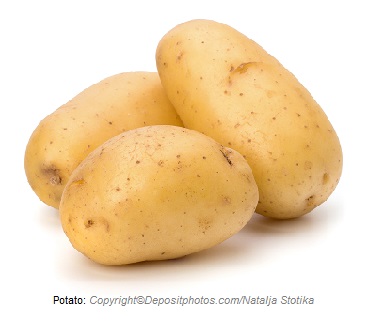Belonging to the nightshade family, potatoes are well-known for being high in starch.  There are thousands varieties of potatoes worldwide. A medium baking potato weighs about 210 grams and provides 38 grams of carbohydrates, 5 grams of fiber and 4 grams of protein.
There are thousands varieties of potatoes worldwide. A medium baking potato weighs about 210 grams and provides 38 grams of carbohydrates, 5 grams of fiber and 4 grams of protein.
Average calories: 168 per one medium.
|
Potato: one medium |
|
|
Carbohydrate |
38 |
|
Fiber |
5 |
|
Protein |
4 |
|
Fat |
0 |
|
Calories |
168 |
Vitamins found in higher amounts: vitamins B6, C, B2, B3 and B9.
Minerals found in higher amounts: potassium, manganese, magnesium, iron and copper.
Phytonutrients found in higher amounts and their health benefits: the phytochemicals in potatoes are phytosterols, flavonoids (luteolin, myricetin, kaemepferol, rutin, and quercetin), carotenoids (lutein), phenolic compounds (especially ferulic acid and caffeic acid), solanine, alpha-solanine, petanin, allantoin, scopoletin, and delphinidins.
Carotenoids are powerful antioxidants that support healthy eyes and protect from age-related eye problems. Lutein is the main carotenoid in potatoes.
Flavonoids and phenolic compounds are potent antioxidants with anti-inflammatory, anti-cancer and immune-boosting properties.
A medium potato contains 10.7 mg of phytosterols. They are plant sterols that can lower bad cholesterol and improve cardiovascular health.
A unique phytonutrient in potatoes is “Solanine”, which is produced by other vegetables from nightshade family, such as peppers, tomatoes and eggplant. It is an alkaloid toxin that the plant produces as a defence mechanism against insects and diseases. Solanine worsens inflammation. This is why potatoes are not recommended in any inflammation or sports injuries, such as strains and sprains, arthritis, bursitis, and tendinitis.
Petanin is an anthocyanin extracted from potatoes.
Also found in substantial amounts in eggplants, cranberries and Concord grapes, delphinidins are anthocyanins that have anti-oxidative activities.

